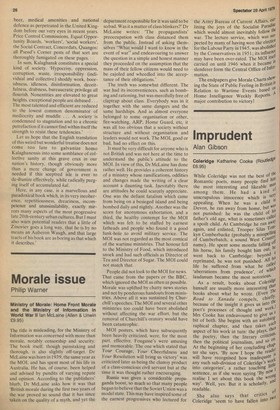Morale issue
Philip Warner
Ministry of Morale: Home Front Morale and the Ministry of Information in World War ll Ian McLaine (Allen & Unwin £9.95) The title is misleading, for the Ministry of Information was concerned with more than morale, notably censorship and security. The book itself, though painstaking and thorough, is also slightly off-target. Dr McLaine was born in 1939, the same year as the MOI, and has spent most of his life in Australia. He has, of course. been helped and advised by pundits of varying repute and opinion. According to the publishers' blurb, Dr McLaine asks how it was that 'British morale during the first two years of the war proved so sound that it has since taken on the quality of a myth, and yet the department responsible for it was said to be so bad. Was it a matter of class blinkers?' Dr McLaine writes: 'The propagandists' preoccupation with class distanced them from the public. Instead of asking themselves "What would I want to know in the event of war" and endeavouring to answer the question in a simple and honest manner they proceeded on the assumption that the mass of their fellow citizens would need to be cajoled and wheedled into the acceptance of their obligations.'
The truth was somewhat different. The war had its inconveniences, such as bombing and rationing, but was mercifully free of claptrap about class. Everybody was in it together with the same dangers and the same hardships. And as almost everyone belonged to some organisation or other, fire-watching, ARP, Home Guard, etc. it was all too obvious that a society without structure and without organisation and leaders would not work. The MOI, good or bad. had no effect on this.
It must be very difficult for anyone who is not British and was not here at the time to understand the public's attitude to the MO!. In view of this, Dr McLaine has done rather well. He provides a coherent history of a ministry whose ramifications, oddities and changes made the writing of a clear account a daunting task. Inevitably there are attitudes he could scarcely appreciate. One was the defiant fatalism which came from being on a besieged island and being bombed daily and nightly. Another was the scorn for anonymous exhortation, and a third, the healthy contempt for the MOI which was felt to be staffed by earnest fatheads and people who found it a good funk-hole to avoid military service. The MOI was not regarded as the most comical of the wartime ministries. That honour fell to the Ministry of Food, which introduced snoek and had such officials as Director of Tea and Director of Sugar. The MOI could not match that. the Army Bureau of Current Affairs, outlining the joys of the Socialist Paradise which would almost inevitably follow the war. The lecture service, which was SO' pected by many of having won the election for the Labour Party in 1945, was abolished by the Conservatives in 1951; its influence may have been over-rated. The MOI itself carried on until 1946 when it became In slenderer form the Central Office of Infer mation. The endpapers give Morale Charts silo!' ing the State of Public Feeling in Britain In Relation to Wartime Events based on Home Intelligence Weekly Reports. A major contribution to victory!
People did not look to the MOI for news. That came from the papers or the BBC, which ignored the MOI as often as possible. Morale was uplifted by chatty news stories and not by ponderous handouts from ministries. Above all it was sustained by Churchill's speeches. The MOI and several other ministries too could have been abolished without affecting the war effort, but the removal of Churchill's oratory would have been catastrophic.
MOI posters, which have subsequently been heavily criticized, were, for the most part, effective. Fougasse's were amusing and memorable. The one which stated that Your Courage, Your Cheerfulness and Your Resolution will bring us victory' was criticized later as being the clumsy product of a class-conscious civil servant but at the time it was thought rather encouraging.
Russia was given a considerable propaganda boost, so much so that many people began to believe that the Soviet Union was a model state. This may have inspired some of the earnest progressives who lectured for






































 Previous page
Previous page